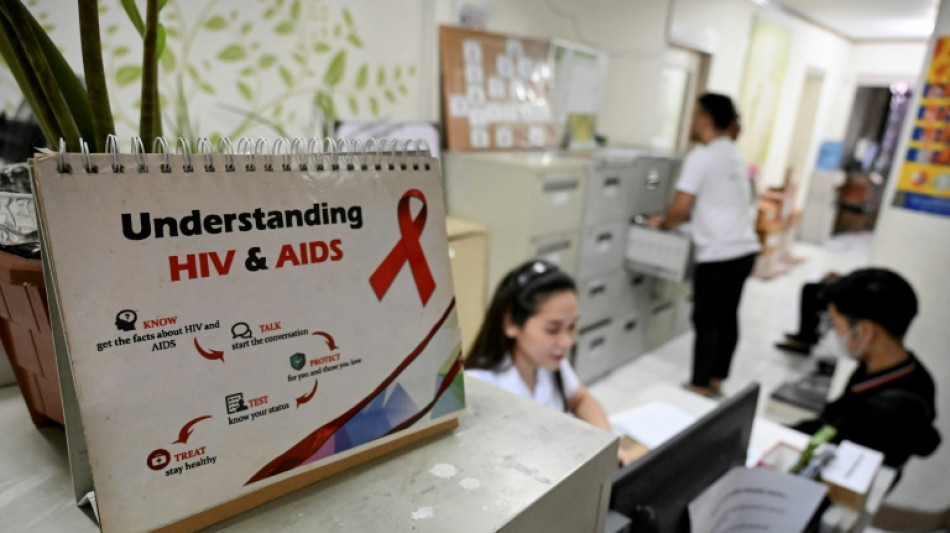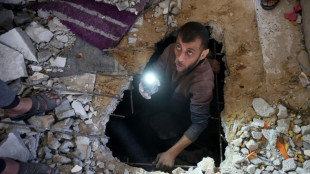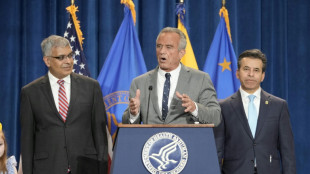
-
 Quartararo sets Spanish MotoGP record to claim pole
Quartararo sets Spanish MotoGP record to claim pole
-
Hamas says open to 5-year Gaza truce, one-time hostages release

-
 Iran, US hold new round of high-stakes nuclear talks
Iran, US hold new round of high-stakes nuclear talks
-
Up at dawn for front-row seat to history at Francis's funeral

-
 Pakistan ready to 'defend sovereignty' after India threats
Pakistan ready to 'defend sovereignty' after India threats
-
Huge crowds flock to Vatican for Pope Francis's funeral

-
 Xi says China must 'overcome' AI chip challenges
Xi says China must 'overcome' AI chip challenges
-
Indian army says new exchange of gunfire with Pakistan

-
 Epstein accuser Virginia Giuffre takes own life in Australia: family
Epstein accuser Virginia Giuffre takes own life in Australia: family
-
Hundreds of buildings damaged, dozens injured in 6.3 Ecuador quake

-
 India and Pakistan's Kashmir fallout hits economy too
India and Pakistan's Kashmir fallout hits economy too
-
Francis's funeral to be grand farewell to 'pope of the poor'

-
 Pogacar faces defiant Evenepoel at Liege-Bastogne-Liege
Pogacar faces defiant Evenepoel at Liege-Bastogne-Liege
-
Chelsea eye great escape against Barcelona in Women's Champions League

-
 Iran, US to hold new round of high-level nuclear talks
Iran, US to hold new round of high-level nuclear talks
-
'Energy and effort' pay off for Reds as Blues' woes continue

-
 Albatross and closing birdie lift China's Liu to LPGA Chevron lead
Albatross and closing birdie lift China's Liu to LPGA Chevron lead
-
On the horizon? Wave of momentum for high seas treaty

-
 Top Mistakes to Avoid When Building Credit History
Top Mistakes to Avoid When Building Credit History
-
Developing countries should fast-track US trade deals: World Bank president

-
 Grizzlies' Morant 'doubtful' for must-win game 4 v Thunder
Grizzlies' Morant 'doubtful' for must-win game 4 v Thunder
-
Trump in Rome for pope funeral in first foreign trip of new term

-
 Trump says Russia-Ukraine deal 'very close' after new Kremlin talks
Trump says Russia-Ukraine deal 'very close' after new Kremlin talks
-
US rookies lead PGA pairs event with McIlroy and Lowry in hunt

-
 Trump tariff promises get a reality check
Trump tariff promises get a reality check
-
Warriors coach Kerr 'relatively optimistic' injured Butler will play game 3

-
 Postecoglou hopes 'Stonecutter's Credo' can inspire Spurs
Postecoglou hopes 'Stonecutter's Credo' can inspire Spurs
-
PSG lose unbeaten Ligue 1 record ahead of Arsenal showdown

-
 Venezuela accuses El Salvador president of 'human trafficking'
Venezuela accuses El Salvador president of 'human trafficking'
-
Own goal takes Sundowns to African final against Pyramids

-
 Scores of buildings damaged, 20 injured in Ecuador quake
Scores of buildings damaged, 20 injured in Ecuador quake
-
US stocks extend rally as market eyes busy calendar next week

-
 Pope's death triggers surge of disinformation he fought against
Pope's death triggers surge of disinformation he fought against
-
Rovanpera takes control of Rally Islas Canarias

-
 Zelensky insists Crimea is Ukrainian as US envoy meets Putin
Zelensky insists Crimea is Ukrainian as US envoy meets Putin
-
Patel and Mendis help Sunrisers beat Kings in Dhoni's 400th T20

-
 Copa del Rey ref statements 'unacceptable': Real Madrid after boycotting final build-up
Copa del Rey ref statements 'unacceptable': Real Madrid after boycotting final build-up
-
Insurance CEO's accused killer pleads not guilty to federal murder charges

-
 FBI arrests Wisconsin judge for shielding undocumented migrant
FBI arrests Wisconsin judge for shielding undocumented migrant
-
Brazil ex-president Collor de Mello jailed for corruption

-
 Zelensky insists Crimea 'belongs' to Ukraine as US envoy meets Putin
Zelensky insists Crimea 'belongs' to Ukraine as US envoy meets Putin
-
Real Madrid boycott Copa del Rey build-up over referee complaints

-
 Trinidad and Tobago votes for parliament, PM, with opposition in lead
Trinidad and Tobago votes for parliament, PM, with opposition in lead
-
IMF chief hails 'constructive' Spring Meetings held under tariff uncertainty

-
 Iran FM Araghchi in Oman ahead of nuclear talks with US
Iran FM Araghchi in Oman ahead of nuclear talks with US
-
Dozens of buildings destroyed, 20 injured in Ecuador quake

-
 Young Barca must 'enjoy' Real Madrid Copa final fight: Flick
Young Barca must 'enjoy' Real Madrid Copa final fight: Flick
-
Pakistan and India border closure separates families

-
 Brazil's Bolsonaro 'stable' after post-surgery setback
Brazil's Bolsonaro 'stable' after post-surgery setback
-
Catholics in secular Cuba hail Francis as 'bridge'


Poor education, stigma fuel Philippines' soaring HIV infections
HIV infections are soaring in the Philippines, with experts blaming online dating, poor sex education and conservative attitudes in the deeply religious country for fuelling the spread of the virus.
While less than one percent of the country's more than 110 million people have been diagnosed with HIV, UN data show it has one of the world's fastest-growing epidemics.
Philippine health officials warn the number of people testing positive for HIV every year is accelerating and the caseload could more than double to over 400,000 by 2030.
The vast majority of new infections are among men having sex with men and transgender women.
A growing number are teenagers.
"It's alarming because it shows that we're not yet controlling the epidemic," said Van Phillip Baton, an adviser for the Joint United Nations Programme on HIV/AIDS (UNAIDS) in the Philippines.
Baton warned the virus could spread to the general population if action wasn't taken.
Experts said social media and online dating sites had fanned infections over the past decade by making it easier for people to find sexual partners.
But increased sexual activity, particularly since Covid-19 restrictions were lifted, has not been matched by a greater use of condoms or pre-exposure prophylaxis drugs to prevent infection, said Baton.
Ignorance was a major factor.
A sexual health study by the University of the Philippines' Population Institute in 2021 showed more than a third of young Filipinos aged 15 to 24 did not believe using condoms could reduce the risk of acquiring HIV.
And the proportion of young Filipinos who had heard of HIV and AIDS had fallen to 76 percent -- the lowest level since 1994.
"This means more information needs to be disseminated to correct the perspectives of young people on HIV/AIDS," said Vicente Jurlano, a professor at the Population Institute.
A family planning law that took effect in 2013 after years of opposition from the Catholic Church required government health centres to hand out free condoms and mandated that sex education be taught in schools.
But people aged under 18 need parental permission to receive condoms.
And the education department only began rolling out "comprehensive sexuality education" in 2018 after legal delays, with the main focus on preventing teenage pregnancy.
Rosalie Masilang of the department's curriculum bureau told AFP that HIV was part of sex education and students were informed about condoms, but they were not shown how to use them.
Many schools, however, do not allow the discussion of condoms or sex, said HIV & AIDS Support House co-founder Desi Andrew Ching, whose non-profit organisation teaches sex education in schools.
"Our culture demonises sex," Ching said.
- 'Stigma and discrimination' -
HIV-positive youth often faced discrimination from family and friends, driving some to depression and even suicide, said Krang, who volunteers at an HIV testing and treatment facility in the central city of Iloilo.
Krang, who asked AFP to use his nickname, said he knew very little about HIV before testing positive for the virus in 2018.
The 23-year-old initially kept his result secret for fear of being ostracised.
"The majority of the youth living with HIV are discriminated against by their peers if they tell them," Krang said, with their status posted on Facebook or shared with their teacher.
Even people trying to practise safe sex faced barriers.
In online discussion forums, young Filipinos complain that they had been put off buying condoms at some pharmacies and small stores after being asked for identification cards or ridiculed.
- More testing centres needed -
UNAIDS has set a goal of ending AIDS as a global health threat by 2030, which includes reducing the number of new HIV cases by 90 percent compared to 2010.
While new infections globally fell 38 percent from 2010 to 2022, the Philippines saw a 418 percent increase -- the fastest-growing HIV epidemic in the Asia-Pacific region and the fourth fastest in the world, UNAIDS data show.
With only 63 percent of HIV-positive Filipinos aware of their status and 41 percent on medication -- far below the UNAIDS target of 95 percent -- more testing and treatment centres were needed, particularly outside cities.
HIV can lead to AIDS if untreated. AIDS-related deaths increased 538 percent in the Philippines between 2010 and 2022, compared with a 51 percent drop in the world, UNAIDS data show.
"The only people who die of AIDS these days are those who were diagnosed late," said John Ruiz, medical director of Klinika Bernardo, which offers free HIV services in Manila.
"I really think the entire population should be open to HIV -- for people not to stigmatise the disease, and for those who are infected not to be ashamed."
Ch.Kahalev--AMWN


